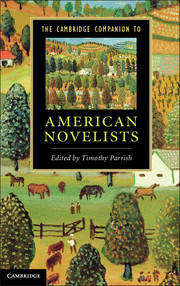Book contents
- Frontmatter
- Contents
- Contributors
- Introduction
- 1 James Fenimore Cooper
- 2 Nathaniel Hawthorne
- 3 Herman Melville
- 4 Harriet Beecher Stowe
- 5 Mark Twain
- 6 Henry James
- 7 Edith Wharton
- 8 Theodore Dreiser
- 9 Willa Cather
- 10 F. Scott Fitzgerald
- 11 Ernest Hemingway
- 12 William Faulkner
- 13 Henry Roth
- 14 Djuna Barnes
- 15 Zora Neale Hurston
- 16 Richard Wright
- 17 Raymond Chandler
- 18 Ralph Ellison
- 19 J. D. Salinger
- 20 Patricia Highsmith
- 21 Vladimir Nabokov
- 22 Jack Kerouac
- 23 Saul Bellow
- 24 Kurt Vonnegut
- 25 John Updike
- 26 Thomas Pynchon
- 27 Toni Morrison
- 28 Philip Roth
- 29 Don DeLillo
- 30 Cormac McCarthy
- Guide to Further Reading
- Index
- References
9 - Willa Cather
Published online by Cambridge University Press: 05 December 2012
- Frontmatter
- Contents
- Contributors
- Introduction
- 1 James Fenimore Cooper
- 2 Nathaniel Hawthorne
- 3 Herman Melville
- 4 Harriet Beecher Stowe
- 5 Mark Twain
- 6 Henry James
- 7 Edith Wharton
- 8 Theodore Dreiser
- 9 Willa Cather
- 10 F. Scott Fitzgerald
- 11 Ernest Hemingway
- 12 William Faulkner
- 13 Henry Roth
- 14 Djuna Barnes
- 15 Zora Neale Hurston
- 16 Richard Wright
- 17 Raymond Chandler
- 18 Ralph Ellison
- 19 J. D. Salinger
- 20 Patricia Highsmith
- 21 Vladimir Nabokov
- 22 Jack Kerouac
- 23 Saul Bellow
- 24 Kurt Vonnegut
- 25 John Updike
- 26 Thomas Pynchon
- 27 Toni Morrison
- 28 Philip Roth
- 29 Don DeLillo
- 30 Cormac McCarthy
- Guide to Further Reading
- Index
- References
Summary
Willa Cather (1873–1947) is one of a handful of undeniably “classic” American authors. Where many of the most cherished American novelists are known primarily for having written one novel that is read again and again, Cather wrote several. The Prairie Trilogy of O Pioneers! (1913), The Song of the Lark (1915), My Antonia (1918), along with A Lost Lady (1923), My Mortal Enemy (1926), and Death Comes for the Archbishop (1927) compose a list of works that would be the envy of virtually any other twentieth-century novelist. Among American novelists, only Henry James and William Faulkner can be said to have written a greater number of novels of enduring value than Cather. My Antonia and Death Comes for the Archbishop stand beside The Scarlet Letter (1850), Moby-Dick (1851), Huckleberry Finn (1884), and Invisible Man (1952) as essential literary works that seem to ask and definitely answer the question of what it has meant to try to be American. Cather may be the most truly “national” writer in the American literary tradition, though as a literary artist her work was uncompromisingly original. Were we to imagine that all of American literature had been bound and contained within a single library and that by some terrible misfortune that library had been set ablaze, the survival of Cather’s works perhaps more than those of any other American writer would speak to future readers and allow them to imagine the challenges and disappointments faced by strangers come together from foreign lands to wrest from nature and each other a civilization that was itself the pursuit of an ideal. She was America’s elegist and, as a novelist, its epic poet.
Cather is known as the writer of Nebraska, a master of the native tongue that became the language of the American plains. Equally important, Cather was profoundly writing within the larger tradition of the novel of James and Hawthorne as well as Tolstoy, Flaubert, and Balzac.
- Type
- Chapter
- Information
- The Cambridge Companion to American Novelists , pp. 82 - 91Publisher: Cambridge University PressPrint publication year: 2012



